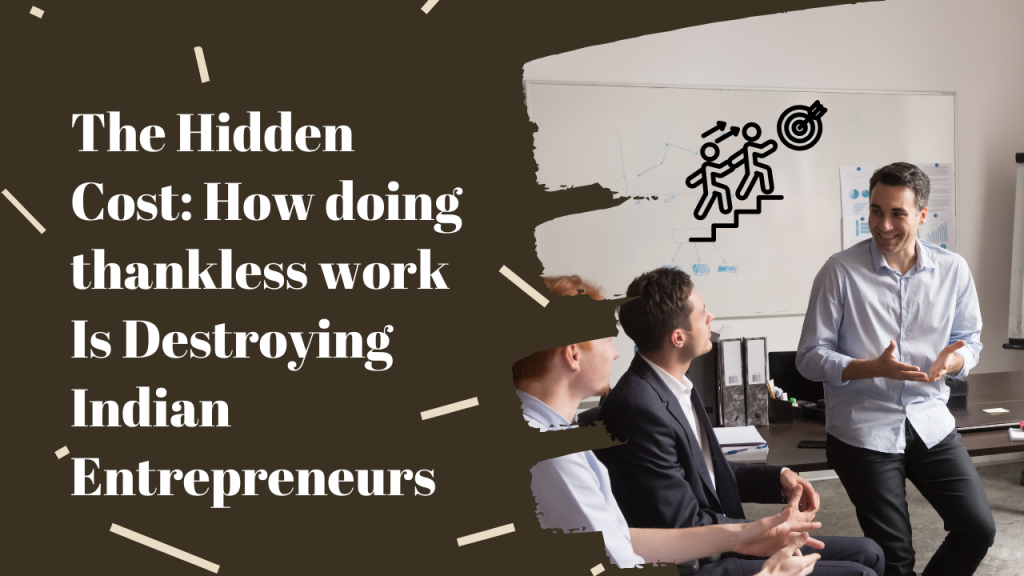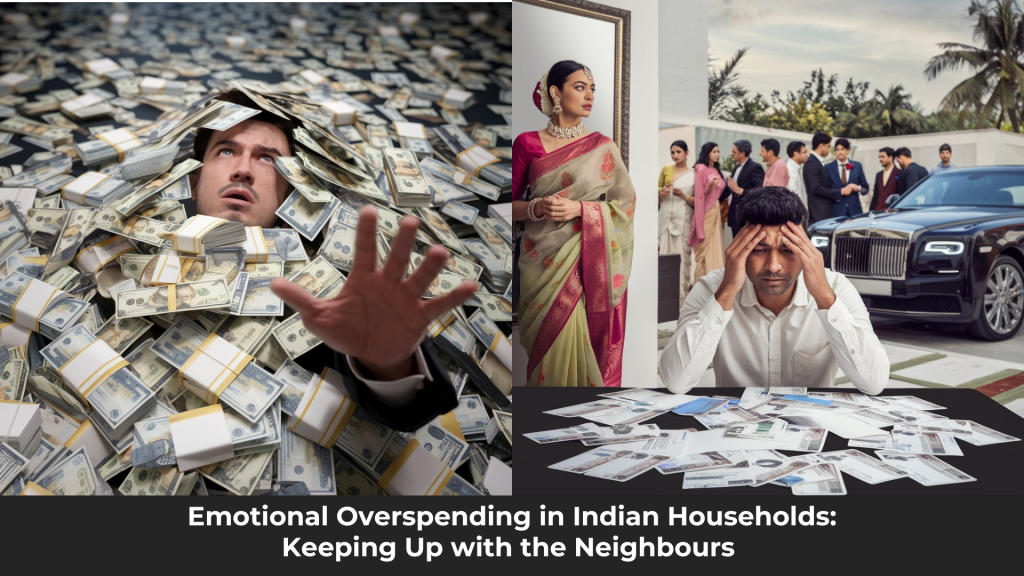
The Hidden Cost: How doing thankless work Is Destroying Indian Entrepreneurs
Many Indians hold the life of a solopreneur or entrepreneur in high esteem. Their contributions to society, the economy, and

Scene: An Indian middle-class home’s living room
With a sigh, Rajesh turned to the most recent credit card statement. His daughter’s extravagant birthday party, a new designer sofa for the drawing room, and a weekend getaway to an upscale resort had all contributed to yet another month of extravagant spending. Neeta, his wife, saw his scowling expression.
“What’s causing your worried expression?” Sitting next to him, she inquired.
“Neeta, we’re spending too much,” he answered. “This credit card bill has gotten out of hand. Are all of these things really necessary?”
Neeta had a defensive expression. “Everyone in the community has improved their furniture, Rajesh. What about the birthday of Riya? When her friends talk about their lavish parties, do you want her to feel ashamed?”
Rajesh gave a headshake. But at what price? We are taking out loans and drawing from our savings. Is this truly worth the effort?
The Psychology of Overspending on Emotions
The predicament faced by Rajesh and Neeta is not unique. Households throughout India are overspending on experiences and goods that are frequently more emotional in nature than necessary. Spending has turned into a means of gaining social approval for everything from expensive gadgets to designer home décor, to extravagant weddings to far-flung vacations.
According to psychologist Dr. Meenal Kapoor, who specializes in financial behaviour, emotional overspending is caused by a deep-seated need for status and social acceptance. People think that what they own or exhibit determines how valuable they are. This tendency is more pronounced in India, where social and community approval are important factors.
Discussions at the Core of Excessive Spending
Rajesh overheard his neighbours talking at a recent family get-together. “Have you seen Sharmaji’s new car?” inquired a neighbour. It’s a BMW, indeed! “They’re living it up,” someone else added.
Rajesh was overcome with a sense of insecurity. He drove a simple sedan that was unobtrusive but perfectly functional. Neeta raised the subject that night. “Perhaps we ought to consider upgrading the vehicle, Rajesh,” she said.
“Why? “Ours is operating perfectly,” he retorted.
“Because everybody else is advancing.” She argued that we shouldn’t lag behind.
This spending and comparison cycle is typical. Regardless of the financial burden it puts on them, families like Rajesh’s frequently feel caught in a race to stay up with their peers.
The Economic Effect
The numbers paint a sobering picture: India’s household debt hit ₹88.9 lakh crore in 2023, a clear sign of a growing dependence on credit cards and loans.
According to a survey conducted by an Indian financial consultancy, 65% of middle-class households went over budget in the previous year, mostly for luxury items, weddings, and trips. 43% of respondents acknowledged that they had no idea how to properly manage their money.
According to Mumbai-based financial advisor Ramesh Gupta, “people are buying things they can’t afford to impress people who probably don’t care.” “This is a sign of a more serious psychological problem, not just bad financial planning.”
The part that inadequate financial literacy plays
Dr. Kapoor goes on to say: “A lot of Indian families don’t know the fundamentals of finance. They have no idea how to invest, save, or create a budget. Rather, they link spending to success and happiness, which feeds a vicious cycle of debt and discontent.”
For example, Rajesh and Neeta lacked a long-term financial strategy. They frequently spent their savings on pointless expenses because they lived paycheck to paycheck.
Breaking the Cycle
Rajesh made the decision to act one day following yet another contentious dispute over costs.
He firmly stated, “Neeta, we cannot continue to live this way.” “I have scheduled a meeting with a financial advisor for us.”
Neeta reluctantly consented. The advisor introduced them to ideas like goal-based saving and budgeting during the session, and she also assisted them in understanding their spending habits.
The advisor advised starting with the question, “Do I need this, or do I want this?” Additionally, keep in mind that other people’s opinions do not determine your value. Don’t live for society; live for yourself.
The Closer Link: Emotional Expenditure and Mental Health
Unrestrained emotional spending can result in more than just financial difficulties, Dr. Kapoor cautions. She says, “It’s associated with anxiety, depression, and low self-esteem.” “People expose themselves to disappointment when they mistakenly believe that having material possessions will make them happy. Genuine happiness originates internally rather than through approval from others.”
The Path to Healing
Rajesh and Neeta changed a lot over the course of the following few months. They learned to resist social pressure, set reasonable financial goals, and began keeping track of their spending.
“It wasn’t simple,” Neeta told a friend. “But we’ve come to realize that spending time with each other and having financial stability, rather than trying to impress others, are the true sources of happiness.”
A More Comprehensive Takeaway for Indian Families
A more significant problem afflicting Indian society is reflected in the tale of Rajesh and Neeta. Families are experiencing debt and emotional distress as a result of emotional spending that is fuelled by social pressures and a lack of financial literacy.
Families need to do the following to escape this cycle:
1. Educate Themselves: Acquire a basic understanding of budgeting and financial planning.
2. Pay Attention to Priorities: Distinguish between necessities and desires.
3. Fight Social Pressure: Recognize that genuine value isn’t dependent on material belongings.
4. Seek Professional Assistance: Counsellors and financial advisors can offer helpful advice.
A More Joyful Conclusion
Months later, Rajesh heard a different type of conversation at another gathering. “Have you seen Rajesh’s car?” inquired a neighbour.
Another said, “Yeah, it’s the same one he’s had for years.” However, did you hear? Next year, he intends to travel abroad, and he will pay for it entirely with cash!
Rajesh gave himself a smile. The most important lesson he had learned was that your own peace of mind is the only thing that counts as validation.
© Dr. Pratik P. SURANA (Ph.D.)
Quantum Group
#FinancialFreedom #IndianHouseholds #SocialPressure #MindfulLiving #SpendSmart #FinancialFreedom #Overspending #FinancialHealth #MentalWellbeing #EmotionalSpending

Many Indians hold the life of a solopreneur or entrepreneur in high esteem. Their contributions to society, the economy, and

Staying competitive, inventing new things, and achieving sustainable growth are constant goals for organizations in today’s interconnected and fast-paced global